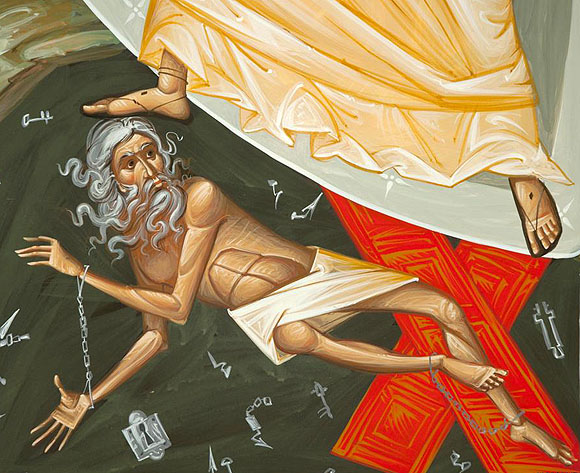Sin Is Not A Moral Problem
30 September 2016 Many readers have never before heard that there is no such thing as moral progress – so I am not surprised that I have been asked to write in more depth on the topic. I will start by focusing on the question of sin itself. If we rightly understand the nature of sin and its true character, the notion of moral progress will be seen more clearly. I will begin by clarifying the difference between the notion of morality and the theological understanding of sin. They are two very different worlds.
Many readers have never before heard that there is no such thing as moral progress – so I am not surprised that I have been asked to write in more depth on the topic. I will start by focusing on the question of sin itself. If we rightly understand the nature of sin and its true character, the notion of moral progress will be seen more clearly. I will begin by clarifying the difference between the notion of morality and the theological understanding of sin. They are two very different worlds.
Morality (as I use the word) is a broad term that generally describes the adherence (or lack of adherence) to a set of standards or norms for behavior. In that understanding, everybody practices some form of morality. An atheist may not believe in God, but will still have an internalized sense of right or wrong as well as a set of expectations for himself and others. There has never been a universally agreed set of moral standards. Different people, different cultures have a variety of moral understandings and ways of discussing what it means to be “moral.”
I have observed and written that most people will not progress morally. This is to say that we do not generally get better at observing whatever standards and practices we consider to be morally correct. On the whole, we are about as morally correct as we ever will be.
This differs fundamentally with what is called “sin” in theological terms. The failure to adhere to certain moral standards may have certain aspects of “sin” beneath it, but moral failings are not the same thing as sin. In the same manner, moral correctness is not at all the same thing as “righteousness.” A person could have been morally correct throughout the whole of their lifetime (theoretically) and still be mired in sin. Understanding sin will make this clear.
“Sin” is a word that is used frequently in a wrong manner. Popularly it is used either to denote moral infractions (breaking the rules), or, religiously, breaking God’s rules. Thus when someone asks, “Is it a sin to do x, y, z?” what they mean is, “Is it against God’s rules to do x, y, z?” But this is incorrect. Properly, sin is something quite distinct from the breaking of rules – St. Paul speaks of it in quite a different manner:
For I know that in me (that is, in my flesh) nothing good dwells; for to will is present with me, but how to perform what is good I do not find. For the good that I will to do, I do not do; but the evil I will not to do, that I practice. Now if I do what I will not to do, it is no longer I who do it, but sin that dwells in me. (Rom 7:18-20)
“Sin that dwells in me?” Obviously “breaking the rules” is not a meaning that fits this use in any possible way. Sin has a completely different meaning. We can take its meaning again from St. Paul:
For when you were slaves of sin, you were free in regard to righteousness. What fruit did you have then in the things of which you are now ashamed? For the end of those things is death. But now having been set free from sin, and having become slaves of God, you have your fruit to holiness, and the end, everlasting life. For the wages of sin is death, but the gift of God is eternal life in Christ Jesus our Lord. (Rom 6:20-23)
Here sin is something to which we can be in bondage, and whose end is death. So what is sin?
Sin is a word that describes a state of being – or, more properly, a state or process of non-being. It is a movement away from our proper existence – God’s gift to His creation. God alone has True Being – He alone is self-existing. Everything else that exists is contingent – it is utterly dependent at every moment upon God for is existence. When God created us, according to the Fathers, He gave us existence. As we grow in communion with Him we move towards well-being. His final gift for us, and that union towards which we properly move, is eternal being.
But there is an opposite to this life of grace. This is a movement towards non-existence, a movement away from God and a rejection of well-being. It is this movement that is called “sin.” We can be in bondage to it, like a leaf trapped in an eddy of water. Sin is not anything itself (for non-being has no existence). But it is described in Scripture by words such as “death” and “corruption.” Corruption or “rot” (φθορά) is an excellent word for describing sin. For it is the gradual dissolution (a dynamic movement or process) of a formerly living thing – its gradual decay into dust.
This differs strikingly from the idea of sin as the breaking of moral rules. The breaking of a rule implies only an outward error, a merely legal or forensic infraction. Nothing of substance is changed. But the Scriptures treat sin far more profoundly – it is itself a change in substance, a decay of our very being.
And here is where some creative re-thinking becomes necessary. The habits of our culture are to think of sin in moral terms. It is simple, takes very little effort, and agrees with what everyone around you thinks. But it is theologically incorrect. That is not to say that you can’t find such moralistic treatments within the writings of the Church – particularly from writings over the past several centuries. But the capture of the Church’s theology by moralism is a true captivity and not an expression of the Orthodox mind.
So how do we think of right and wrong, of spiritual growth, of salvation itself if sin is not a moral problem? We do not ignore our false choices and disordered passions (habits of behavior). But we see them as symptoms, as manifestations of a deeper process at work. The smell of a corpse is not the real problem and treating the smell is not at all the same thing as resurrection.
The work of Christ is the work of resurrection. Our life in Christ is not a matter of moral improvement – it is life from the dead. We are buried into His death – and it is a real death – complete with all that death means. But His death was not unto corruption. He destroyed corruption. Our Baptism into Christ’s death is a Baptism into incorruption, the healing of the fundamental break in our communion with God.
So what does that healing look like? Is it wrong to expect some kind of progress to be taking place?
My life experience (34 years as a priest) and reading of the Fathers and the Tradition suggest that such expectations are indeed misplaced. I puzzled over this for many years. I have come to think of our salvation as similar to the reality of the sacraments. What do you see in the Eucharist? Does the Bread and the Wine go through a progressive change? Do we see a transformation before our very eyes?
What seems to be true is that our salvation is largely hidden – sometimes even from ourselves. The Christian faith is “apocalyptic” in its very nature – it is a “revealing of that which is hidden.” The parables of filled with images of surprise: a treasure discovered, etc. Salvation has a way of just appearing. I often think of the liturgical drama in an Orthodox liturgy as imaging this very thing – thus the doors and the curtain and the “now you see it – now you don’t – now you really see it” flow of the service.
Finding our salvation means turning away from the appearance of things. It requires a deep and fundamental inward re-orientation of our lives. It requires the inward work of repentance. The moral life is lived on the surface – even atheists behave in a moral manner. When we turn towards Christ-in-us, we move beneath the surface. We begin to see how ephemeral and confused our actions are.
These actions are mostly the work of a false self, an ego that is broken and shamed and struggles frantically “to be better.” But the heart of the Christian spiritual life is not through this path of an improved ego, but through the path of “death to self,” in which we lose an existence that is not our true self, and learn an existence that is ours in Christ. But what we see is often something else. For while we are finding the truth, the other still clings to its false existence – and this is primarily what we see and what others see. The hidden work of salvation remains unseen.
It is not at all unusual in the lives of the saints for the sanctity of an individual to remain hidden until their death. This was the case for St. Nectarios of Aegina. He was dismissed by many, though seen truly by a few. But at his death, miracles began to flow from him, and suddenly the stories began to surface.
And mysteriously, it seems this hidden life is often just as hidden from the saint themselves (just as our own true life is hidden from us). I think God preserves us from the burden of this knowledge for the sake of our salvation.
Set your affection on things above, not on things on the earth. For you are dead, and your life is hid with Christ in God. When Christ, who is our life, shall appear, then shall you also appear with him in glory. (Col 3:2-4)
This is, again, the apocalyptic character of the Christian life. We are dead and our true lives are hid with Christ in God – and they will appear when He appears.
So what do we see in this life? The simple answer is clear: Christ. It is not our own improvement we search for, but Christ. Our own improvement slowly ceases to matter as we find Christ. And the more we find Him, the more clearly the false nature of the ego seems clear to us, and we can say, “I am the worst of all sinners.”
Source: http://blogs.ancientfaith.com/glory2godforallthings/







